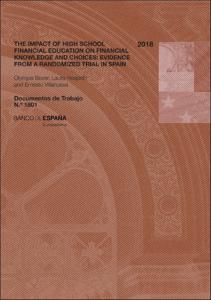The impact of high school financial education on financial knowledge and choices : evidence from a randomized trial in Spain
Autor
Fecha de publicación
17-ene-2018
Descripción física
54 p. : gráficos, tablas
Resumen
Este estudio analiza cómo un curso de 10 horas sobre finanzas personales desarrollado en la Educación Secundaria Obligatoria afecta al conocimiento financiero y a las decisiones de los estudiantes participantes, en un horizonte temporal de tres meses tras su finalización. Los contenidos del curso abarcan el diseño de presupuestos familiares, las relaciones con las entidades bancarias, los vehículos de ahorro, y las consecuencias futuras de decisiones de ahorro y de endeudamiento. Para obtener estimaciones fiables de su efecto, se asignó aleatoriamente el momento del curso académico 2014-2015 en el que alrededor de 3.000 estudiantes de 3.º de la ESO en 78 centros de Secundaria recibieron estas enseñanzas. Justo después del curso, los alumnos tratados obtuvieron calificaciones superiores a los controles en el 16 % de una desviación estándar, además de ser más propensos a involucrarse en asuntos financieros en el hogar y mostrar un mayor grado de paciencia en opciones hipotéticas de ahorro. En una prueba incentivada de ahorro realizada tres meses después de recibir el curso, los jóvenes tratados asignaron al consumo presente una cantidad inferior de recursos (para diferentes tipos de interés y plazos de vencimiento) que un grupo de estudiantes de control de 4.º de la ESO. Los resultados de mayor rendimiento en los exámenes y el mayor grado de elección de opciones pacientes en la prueba incentivada de ahorro entre los tratados son estadísticamente significativos en los estratos con estudiantes provenientes de un entorno socioeconómico menos favorecido
We study how a 10-hour course about personal finance delivered in compulsory secondary education affects a wide range of student’s outcomes over a three months horizon. The contents of the course covered budgeting, banking relationship and saving vehicles, but also awareness about future outcomes. To obtain reliable estimates, we conducted a randomized field experiment where 3,000 9th grade students coming from 78 Spanish high schools received financial education at different points of the academic year. Right after the course, performance in standardized tests of financial knowledge increased by 16% of one standard deviation, and treated youths were more likely to become involved in fi nancial matters at home and showed a higher degree of patience in hypothetical saving choices. An incentivized saving task conducted three months after delivering the course suggests that treated youths displayed more patient choices at various interest rates and maturities than a control group of 10th graders. The results of higher performance in financial test scores and the higher degree of patient choices in the incentivized saving task among the treated are statistically significant in strata with students with a relatively more disadvantaged background
We study how a 10-hour course about personal finance delivered in compulsory secondary education affects a wide range of student’s outcomes over a three months horizon. The contents of the course covered budgeting, banking relationship and saving vehicles, but also awareness about future outcomes. To obtain reliable estimates, we conducted a randomized field experiment where 3,000 9th grade students coming from 78 Spanish high schools received financial education at different points of the academic year. Right after the course, performance in standardized tests of financial knowledge increased by 16% of one standard deviation, and treated youths were more likely to become involved in fi nancial matters at home and showed a higher degree of patience in hypothetical saving choices. An incentivized saving task conducted three months after delivering the course suggests that treated youths displayed more patient choices at various interest rates and maturities than a control group of 10th graders. The results of higher performance in financial test scores and the higher degree of patient choices in the incentivized saving task among the treated are statistically significant in strata with students with a relatively more disadvantaged background
Notas
Publicado también como CEPR Discussion Paper n. 12632 e IZA Discussion Paper n. 11265
Publicado en
Documentos de Trabajo / Banco de España, 1801
Materias
Educación financiera; Evaluación de impacto; Decisiones intertemporales de consumo y ahorro; Financial education; Impact evaluation; Consumo; Economía del consumo y del ahorro; Economía general; Mercado de trabajo; España
Aparece en las colecciones:












